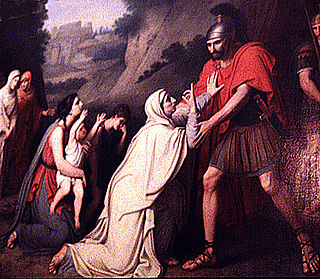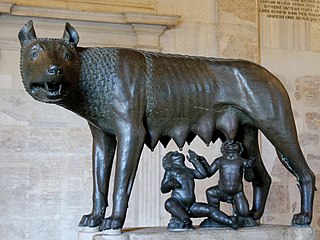Related Research Articles

GnaeusMarcius Coriolanus was a Roman general who is said to have lived in the 5th century BC. He received his toponymic cognomen "Coriolanus" following his courageous actions during a Roman siege of the Volscian city of Corioli. He was subsequently exiled from Rome, and led troops of Rome's enemy the Volsci to besiege the city.

Spurius Cassius Vecellinus or Vicellinus was one of the most distinguished men of the early Roman Republic. He was three times consul, and celebrated two triumphs. He was the first magister equitum, and the author of the first agrarian law. The year following his last consulship, he was accused of aiming at regal power, and was put to death by the patricians.

The patricians were originally a group of ruling class families in ancient Rome. The distinction was highly significant in the Roman Kingdom and the early Republic, but its relevance waned after the Conflict of the Orders. By the time of the late Republic and Empire, membership in the patriciate was of only nominal significance. The social structure of ancient Rome revolved around the distinction between the patricians and the plebeians. The status of patricians gave them more political power than the plebeians, but the relationship between the groups eventually caused the Conflict of the Orders. This time period resulted in changing of the social structure of ancient Rome.
Gaius Terentilius Harsa or Caius Terentilius Arsa was a Tribune of the Plebs of the early Roman Republic in 462 BC. In 467 BC, Gaius agitated the plebeians to limit the power of consuls.
In ancient Rome, a gens was a family consisting of individuals who shared the same nomen gentilicium and who claimed descent from a common ancestor. A branch of gens, sometimes identified by a distinct cognomen, was called a stirps. The gens was an important social structure at Rome and throughout Italia during the period of the Roman Republic. Much of individuals' social standing depended on the gens to which they belonged. Certain gentes were classified as patrician, others as plebeian; some had both patrician and plebeian branches. The importance of the gens as a social structure declined considerably in imperial times, although the gentilicium continued to define the origins and dynasties of the ancient Romans, including the emperors.
The lex Canuleia, or lex de conubio patrum et plebis, was a law of the Roman Republic, passed in the year 445 BC, restoring the right of conubium (marriage) between patricians and plebeians.
The interrex was an extraordinary magistrate during the Roman Kingdom and Republic. Initially, the interrex was appointed after the death of the king of Rome until the election of his successor, hence its name—a ruler "between kings". The position was retained during the Republic when both consuls were unable to assume their duties, especially holding elections. Interreges ruled for only five days, which often led several of them to be appointed in succession, the record being 15 interreges in 326 BC. They were exclusively chosen from among patrician senators, and during the Conflict of the Orders, their appointment was sometimes designed to hinder plebeians from reaching power or passing laws.
Tribune of the plebs, tribune of the people or plebeian tribune was the first office of the Roman state that was open to the plebeians, and was, throughout the history of the Republic, the most important check on the power of the Roman Senate and magistrates. These tribunes had the power to convene and preside over the Concilium Plebis ; to summon the senate; to propose legislation; and to intervene on behalf of plebeians in legal matters; but the most significant power was to veto the actions of the consuls and other magistrates, thus protecting the interests of the plebeians as a class. The tribunes of the plebs were typically found seated on special benches set up for them in the Roman Forum. The tribunes were sacrosanct, meaning that any assault on their person was punishable by death. In imperial times, the powers of the tribunate were granted to the emperor as a matter of course, and the office itself lost its independence and most of its functions.
Agrarian laws were laws among the Romans regulating the division of the public lands, or ager publicus. In its broader definition, it can also refer to the agricultural laws relating to peasants and husbandmen, or to the general farming class of people of any society.
Secessio plebis was an informal exercise of power by Rome's plebeian citizens between the 5th century BC and 3rd century BC., similar in concept to the general strike. During the secessio plebis, the plebs would abandon the city en masse in a protest emigration and leave the patrician order to themselves. Therefore, a secessio meant that all shops and workshops would shut down and commercial transactions would largely cease. This was an effective strategy in the Conflict of the Orders due to strength in numbers; plebeian citizens made up the vast majority of Rome's populace and produced most of its food and resources, while a patrician citizen was a member of the minority upper class, the equivalent of the landed gentry of later times. Authors report different numbers for how many secessions there were. M. Cary and H. H. Scullard state there were five between 494 BC and 287 BC.
Sacrosanctity or inviolability is the declaration of physical inviolability of a place, a sacred object, or a person. Under Roman law, this was established through sacred law, which had religious connotations. Festus explained that: “Sacred laws are laws which have the sanction that anyone who broke them becomes accursed to one of the gods, together with his family and property”. In some cases the law may have been applied to protect temples from being defiled. It could also be applied to protect a person who was declared sacrosanct (inviolable). Those who harmed a sacrosanct person became sacer (accursed) through the declaration sacer esto!. The offender was considered as having harmed the gods or a god, as well as the sacrosanct person and therefore accursed to the gods or a god. This meant that the offender became forfeit to the god(s) and on his death he was surrendered to the god(s) in question. The implication was that anyone who killed him was considered as performing a sacred duty and enjoyed impunity.
Aulus Aternius Varus Fontinalis was consul in 454 BC, with Spurius Tarpeius Montanus Capitolinus.

The gens Canuleia was a minor plebeian family at ancient Rome. Although members of this gens are known throughout the period of the Republic, and were of senatorial rank, none of them ever obtained the consulship. However, the Canuleii furnished the Republic with several tribunes of the plebs.
The gens Verginia or Virginia was a prominent family at ancient Rome, which from an early period was divided into patrician and plebeian branches. The gens was of great antiquity. It frequently filled the highest honors of the state during the early years of the Republic. The first of the family who obtained the consulship was Opiter Verginius Tricostus in 502 BC, the seventh year of the Republic. The plebeian members of the family were also numbered amongst the early tribunes of the people.
The Lex Trebonia was a law passed in 448 BC to forbid the tribunes of the plebs from co-opting colleagues to fill vacant positions. Its purpose was to prevent the patricians from pressuring the tribunes to appoint colleagues sympathetic to or chosen from the aristocracy.
Servius Sulpicius Camerinus Cornutus was a Roman politician in the 5th century BC, consul in 461 BC and decemvir in 451 BC.
Titus Romilius Rocus Vaticanus was a Roman politician in the 5th century BC, consul in 455 BC, and decemvir in 451 BC.
Spurius Oppius Cornicen was a Roman politician and member of the Second Decemvirate in 450 and 449 BC.
Quintus Poetelius Libo Visolus was a Roman politician, and member of the Second Decemvirate in 450 and 449 BC.
Spurius Tarpeius Montanus Capitolinus was consul in 454 BC, with Aulus Aternius Varus.
References
- ↑ Naphtali Lewis; Meyer Reinhold (January 1990). Roman Civilization: Selected Readings. Columbia University Press. pp. 118–. ISBN 978-0-231-07131-4.